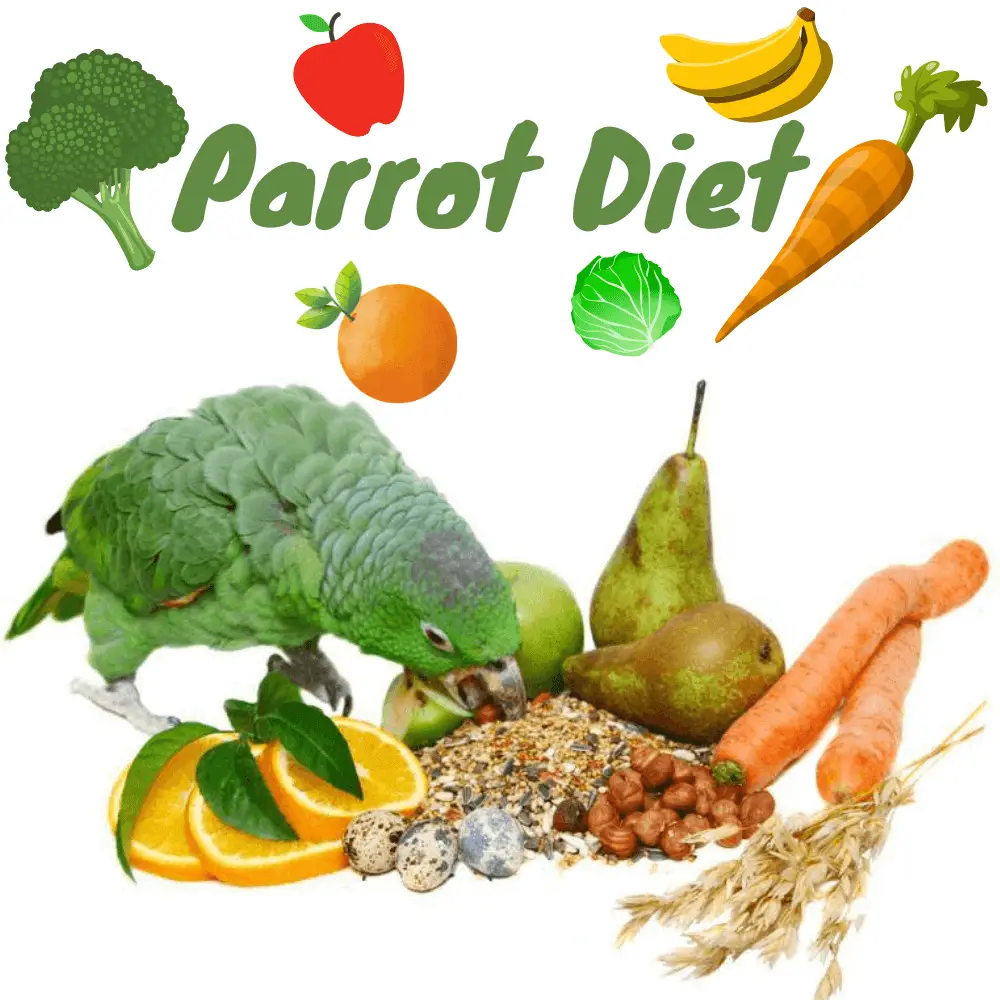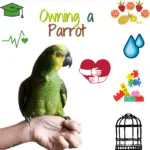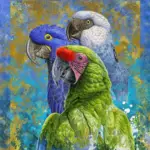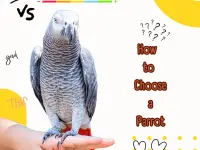
What does a parrot eat? Parrot diet This is one of the main causes of disease in parrots, the diet must be varied! Basic or complimentary food, we guide you!
Diet for parrot
The mixture of seeds…
It is the food most given to parrots, they love it! The mixture must be made up of 70% cereals (wheat, millet, canary seed, corn, etc.) and 30 % oilseeds (sunflower, hemp seeds, peanuts, parrot food list.). Watch out for obesity with the mix, some parrots sort out their mix a lot. Do not hesitate to leave the bowl an extra day to avoid waste. It is very complicated to switch a seed-fed parrot to an extruded diet (habit sorting, opening the shells, etc.). The seed mix should be of good quality to avoid any deficiency and supplemented with fresh food daily.
Or extruded ones
Extruded kibbles are specially designed for parrots. They contain the same ingredients as a seed mix except that they cannot be sorted. Most extrudates don’t need extra vitamins because they already contain them.
Costs are so important
The fresh is always complicated to integrate for a parrot that is not accustomed to it, it is however the best contribution in vitamins! It is to be integrated gently to avoid any diarrhea. The cost is as close as possible to what a parrot could find in the wild. And yes, the seeds are not all beautiful all dry in the Amazon or Australian forest! It will be important to vary it (find our list of fruits and vegetables for parrots ).
Complementary feeding
The mash
It is very useful during the breeding period or when the temperature drops (parrots living outdoors in winter). It allows a richer nutritional intake.
The sweets
It is essential for teaching your parrot tricks. They are so fond that they would do anything for a little treat in return! Natural treats are better for his health, so you can give him dried fruits and nuts or peanuts.
In practice:
The African Grey is a frugivorous and granivorous bird, that is to say, its food does not contain any animal protein and its diet will be mainly composed of seeds and cereals. Be careful, the food mixture should not be given in an anarchic way, because the aviary parrot does not practice the same physical effort like that in the wild.
Lipid intake must therefore be controlled, so even if he is particularly fond of it, fatty nuts such as groundnuts (peanuts), hazelnuts… or sunflower seeds should be given very sparingly. Preferably choose mixtures of seeds low in sunflowers, and whose contribution will avoid deficiencies in the bird.
In general, the adult parrot in good health eats 40g of daily ration divided into 2 meals. This ration will consist of a mixture of fresh fruits and vegetables, dry seeds, sprouted seeds (richer in protein), and cereals. It is recommended to opt for an extruded form of granules, all the nutritional contributions will be concentrated in a mixture of croquettes which will prevent the bird from sorting and therefore from being deficient in vitamins and minerals. To this can also be added food supplements in the drink. Water must be served permanently, renewed daily, (an adult parrot drinks 20 ml per day on average).
Parrot food
The Parrot diet Some examples of foods that can be given:
- The plantain, you will find in the meadows (watch out for pesticides and others)
- chickweed or chickweed
- Dandelion
Some vegetables are very important:
- spinach
- Lamb’s lettuce
- The carrot
- The tomato
Fruit in small quantities (a quarter):
- Apple
- The kiwi
- orange
- Blackberries, raspberries
- The pear
- The watermelon
- Fresh fig is an excellent food
- pitless cherries
The cereals :
- canary seed,
- Millet,
- But,
- Wheat,
- Spelled,
- Sarazin,
- oats,
- paddy rice
What not to give:
- Chocolate
- the lawyer
- caffeine
- The alcohol
- Apple seeds, pits of any kind (because they contain cyanide)
- Products containing lactose
- Garlic and onions, cooked or raw
- Salt.
Parrot Fruit
Fruit seeds, should or should they not be removed?
For safety, seeds should always be removed. Many seeds and fruit lumps such as apples, cherries, pears, peaches, and apricots, and others contain traces of cyanide and should not be consumed by birds. In addition, when you put fruit it is common for birds to seek seeds immediately!!!…
Not least it is the need to wash very well and/or peel the fruits as there may be pesticides in their shell. I’ve been saying this all the time, but I’ll explain that seeds have to do with the flower that originated the fruit. The flower takes with a lot of insecticide/pesticide and is held when the flower turns into the core into seeds that are inside the fruit, where the insecticides are also held and are poisonous, for that same reason you should not give the fruit centers that formed from the flower of the tree.
Do not give apple seeds, apricot, cherry, lychees, peach, pear, plum, orange/tangerine/nectarine/clementine, this is because these seeds come from the flower of the trees that are exposed to pesticides and this flower forms the center of the fruit and the seeds and cannot be given to contain the pesticides/insecticides that are poisonous, you should throw away that part of the fruit.
Melon seeds, papaya, pomegranate, kiwi can be offered without any problem, they were not exposed to pesticides and these are safe to give our birds without any risk.
Toxicity of Apple Seeds and other fruit seeds that originate from the flower:
Apple seeds do contain small amounts of cyanide and other pesticides used to spray the flowers that formed the seeds, which is a lethal poisonous, you are protected from the toxin by the hard seed coating, but once the hard coating is broken the poison goes to the bloodstream.
Dates are the Healthiest Fruit and also a Natural Cure:
Dates are among the most nutritious and advantageous natural products on the planet, and the rundown of manners by which they enhance well-being is actually interminable. They have a great dietary profile, as a 100 grams (3,5 oz) serving gives:
2 grams of protein
7 grams of fiber
75 grams of carbs
277 calories
12 of the RDI of vitamin B6
5% of the RDI of iron
18% of the RDI of copper
14% of the RDI of magnesium
20% of the RDI of potassium
Parrot food
The dates are also a rich source of antioxidants, and the most potent ones are the ones below, the Healthline concluded:
Phenolic Acid — Known for its mitigating properties, phenolic corrosive may help bring down the danger of malignant growth and coronary illness.
Carotenoids — Carotenoids are demonstrated to advance heart wellbeing and may likewise diminish the danger of eye-related scatters, for example, macular degeneration.
Flavonoids — Flavonoids are incredible cell reinforcements that may help lessen irritation and have been contemplated for their capability to diminish the danger of diabetes, Alzheimer’s malady, and particular sorts of malignant growth.
And also below in the article, you can read about some of the main and most important health benefits that these fruits offer:
Apple seeds do contain small amounts of cyanide and other pesticides used to spray the flowers that formed the seeds, which is a lethal poisonous, you are protected from the toxin by the hard seed coating, but once the hard coating is broken the poison goes to the bloodstream.
Parrot food
How to Use Food as a Training Tool | Parrot Training
SOURCE:Howcast























